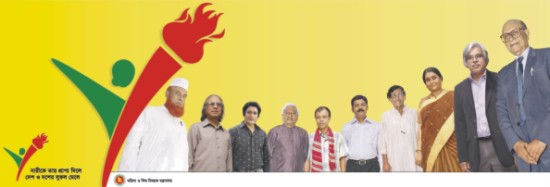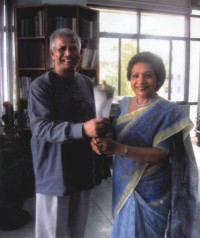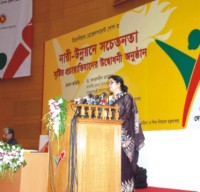|
Reflections
Taking It Forward
Aasha Mehreen Amin

Dr. Fakhruddin Ahmed |
Few official functions in Dhaka can be described as short and sweet. Which is why the brevity of the programme arranged by the Ministry of Women and Children Affairs on July 24 at the Bangladesh China Friendship Conference centre, turned out to be both refreshing and inspiring. Inspiring also because it was attended by the Chief Adviser giving the issue the importance that it deserved. The launching of a mass awareness campaign on gender equality and empowerment of women internationally known as Millenium Development Goal 3 or MDG3, turned out to be an occasion for everyone present at the venue to pledge their commitment to forward the cause.
Statements that laud women's role in development and progress may seem rather clichéd in an age when women are involved in practically every field imaginable and in many cases excelling in them. But the truth is that while women are actively involved at every stage of development their contributions are rarely recognised and evaluated. It is this valuable reward - to be acknowledged for their work- that is behind the MDG3 and the manifestation of this recognition takes form in things like equal opportunities in education and employment, in an end to violence against women, equal status in society, in the right to own property etc.

Taking the extra step forward, the champions who speak for the cause in the TV spots.
At the event, Rasheda K Chowdhury, Adviser, Ministry of Women and Children Affairs, listed the number of sectors where women are showing their worth in Bangladesh. Women have shown themselves to be reliable borrowers in micro credit schemes. They have made the orsaline and immunisation stories a huge success in Bangladesh, reducing innumerable child deaths. Women play major roles in industry, for example in the ready-made garments sector, in agriculture, poultry etc. Women know the importance of education and will send their children to school no matter how poor they are. Chowdhury, who herself has been a major player in improving education in the country much before her official post as adviser, added that there is also support from many men in these succeses and this spirit of support must be spread all over the country. She also remarked that she hoped that future political governments would show the same commitment as the Chief Adviser Dr. Fakhruddin Ahmed, had shown. The Chief Adviser on his part, stressed the need for increased participation of women in all fields and the importance of taking steps to change the negative attitude towards women's education in some parts of society.

Geeteara Safiya Choudhury receiving the Champion's torch from Dr. Yunus earlier this year. |
The campaign is part of a worldwide effort to achieve the MDG 3 announced by the United Nations along with seven other Millenium Development Goals. In Bangladesh, the campaign has started off with TV spots where people from various walks of life pledge their commitment to gender equality and women's economic empowerment and appeals to the audience to do the same. They include prominent persons in society including Fazle Hasan Abed, Abdullah Abu Sayeed, Dr. Kholiquzzaman, Ferdousi Rahman, Ferdous (Actor) Dr M.R. Khan (child specialist), Anwar-ul-Alam (BGMEA President) and Moulana Abul Kalam Azad (religious leader). But it also has statements from a professional Kazi Asghar Ali, as well as a rickshawpuller, Chandu Mia. The messages are simple: acknowledge women's roles in the development of our nation and give that extra effort to improve their opportunities whether it is in education, health, employment or just the respect they deserve as mothers and life partners. The key slogan is 'Narike tar prappyo dile, desh o dosher shuphol mile' (If you give women their due, the country and its citizens will all benefit).
On 7 March 2008 in Copenhagen, the Danish Government launched the MDG3 Global Call to Action an initiative to put gender equality and women's empowerment (MDG3) higher at the international agenda to accelerate the achievement of all the Millennium Development Goals (MDGs). A global MDG3 Champion Torch is at the heart of the campaign. At least 100 Torches will travel the world, requesting Torch Bearers representing governments, the private sector, civil society, international organisations and the media to make an additional commitment to “Do Something Extra” in support of implementing MDG3.
Nobel Prize Winner, Professor Muhammad Yunus, was one of the first to support the initiative and commit to “Do Something Extra”. The Torch can be requested and passed on. At the UN High Level Meeting on the MDGs in September in New York, all commitments will be presented to the UN Secretary General who will be invited to accept the last Torch. The Torch Bearers can use the Torch to create increased awareness and support for gender equality.

Rasheda K Chowdhury at the launching ceremony. |
At the July 24 programme, Rasheda K. Chowdhury handed the torch to the Chief Advisor symbolising the Bangladesh Government's commitment to the cause.
The idea for this kind of campaign originated from one of the Champions of the Network, Geeteara Safiya Choudhury, Chairman and MD of Adcomm and former adviser of the Caretaker Government. Choudhury drew from her experience in the ministry and her profession which required her to travel all around the country, giving her the opportunity to interact with women in the rural areas. “My experience at the ministry showed that the government has done many things that are pro-women that I myself didn't know about and suspected that many people weren't aware of. When I went outside Dhaka I found that many women weren't sending their daughters to school because they didn't know that education for girl children was free upto Grade 12. In Jessore there is a Danida-funded One-stop Crisis Centre for women victims of violence but few women knew about it and the fact that they not only gave free treatment but also provided legal aid and rehabilitation programmes. Many people including the perpetrators or sellers of acid don't know that that the punishment for acid violence is the death penalty. Thus there is a great need for a mass awareness campaign.” Hence the idea was formed; to have these TV spots where both famous and ordinary people would talk about a particular aspect of women's empowerment and appeal to the public to give that extra effort to promote the cause.
The idea was later lauded by the Danish Government and will be shared with other countries. The governments of Denmark, Sweden, Norway and DFID have promised to fund the campaign while the government of Bangladesh has committed to put it into action.
What is unique about the campaign is that it places the onus of forwarding the cause of women's empowerment on everyone, not just a group of people or the State. Every one of us has the capability to give that extra effort to make sure that women get their due. Whether it is as small as sending a poor girl child to school or making sure a domestic worker gets good medical care or as big as giving jobs to thousands of women or setting up a hospital for the poor, every little effort can make a difference.
Copyright
(R) thedailystar.net 2008 |
